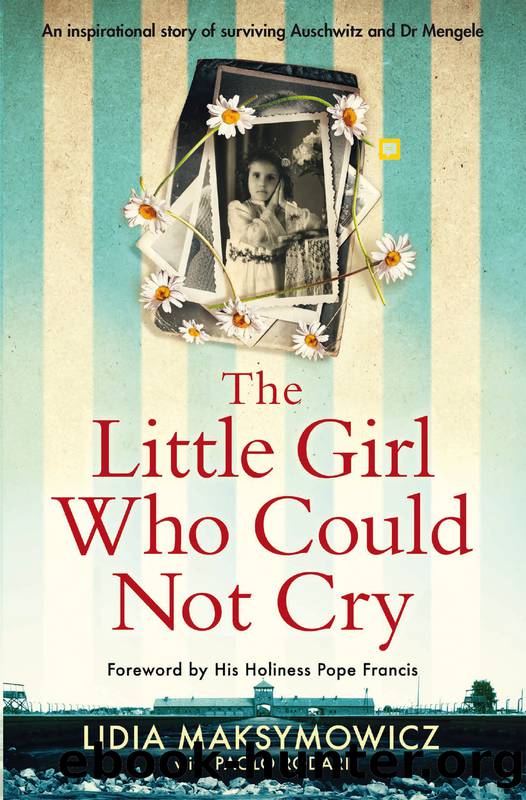The Little Girl Who Could Not Cry by Lidia Maksymowicz

Author:Lidia Maksymowicz [Maksymowicz, Lidia]
Language: eng
Format: epub
Publisher: Pan Macmillan UK
Published: 2022-12-12T17:00:00+00:00
6
LIVING IN POLAND AFTER THE LIBERATION wasnât easy. But it only dawned on me once I was an adult that this was also the case in many of the neighbouring countries, including the Soviet Union.
The great terror of the war didnât end in 1945. Unfortunately it had a long way to go. The German defeat didnât open up scenarios of paradise on earth but, at least for one part of Europe, horizons of darkness and suffering. The heart of all of this was Central Europe, and with it the Soviet Union. The Red Army had liberated the German camps, but it also meant that many Poles were forced to return home, unable to move or travel. In many cases those who rebelled against the new regime were deported to other concentration camps, the Soviet gulags. They too were places of death and despair. A certain amount of oppression was part of everyday life. The Communist regimes of the countries around the Soviet Union owed it respect and obedience. After the shadow of Hitler, the shadow of Stalin, of Moscow, fell upon that part of Europe. Poland, Czechoslovakia, Hungary, Romania and Bulgaria fell into a new nightmare.
The largest apartments in Moscow and St Petersburg were turned into communal apartments, and similar things happened to the apartments in other Soviet cities. Once again, as in OÅwiÄcim before the camp was built in Birkenau, many houses were expropriated. In the Soviet Union, however, they werenât destroyed but reused. They were called kommunalka â apartments designed to optimise the availability of living spaces. The former owners were left only one room for their families and their belongings. All the rest was assigned to strangers. Toilets and the kitchen were communal. The Soviet ideology transformed the everyday life of an entire generation. Day by day, poverty and misery became part of many peopleâs lives.
The regime abhorred any manifestation of luxury. No affluence could be permitted. The boom beginning on the other side of the Iron Curtain, in Western Europe, was seen here as absolute evil. In fact, people wanted to climb the social ladder and attain a different lifestyle. But the regime blocked all initiatives. There was no room for dreams in this part of the world. Often there were even food shortages. For anyone who had experienced the hardships of the extermination camps, life in the Soviet Union and its satellites seemed like a cruel joke, even though nothing, obviously, was comparable to the German camps.
When my mother went back to the Soviet Union, she was in a terrible state. She was 5 ft 8 (1.74 m) and weighed barely 6 stone (37 kg). And yet â I would find out later â after a few weeks of intensive medical treatment, she decided to leave for OÅwiÄcim in the hope of finding me. She was informed by the Red Army, however, that all the children in Birkenau had been sent to orphanages in the Soviet Union. Back at home, she was miraculously reunited with my father.
Download
This site does not store any files on its server. We only index and link to content provided by other sites. Please contact the content providers to delete copyright contents if any and email us, we'll remove relevant links or contents immediately.
Anka's Secret: An epic, heartbreaking, and powerful World War 2 novel based on true events by Tamar Ohrenstein(326)
American Seoul by Rho Helena(226)
Vice President Kamala Harris by Malaika Adero(215)
Owner of a Lonely Heart by Beth Nguyen(189)
Persephone's Children by Rowan McCandless(169)
The Life of Madie Hall Xuma by Wanda A. Hendricks(160)
The Little Girl Who Could Not Cry by Lidia Maksymowicz(157)
Girl Uprooted: A Memoir by Lena Lee(156)
The Survivor From Block 19 by Arie Blumenfeld(152)
From Liberty To Magnolia by Janice Ellis(151)
Mi historia by Rosa Parks & Jim Haskins(151)
634 Ways to Kill Fidel by Fabian Escalante(145)
Women Surviving Apartheid's Prisons by Shanthini Naidoo Donna Bryson(142)
A Hole In the Clouds by Maryles Casto(141)
Growing Out by Barbara Blake Hannah(138)
Black Founder by Stacy Spikes(130)
Remembering the Power of Words by Unknown(128)
My Childhood's Days in Slavery by Annie L. Burton(128)
Truths and Lies in the Middle East by Eric Rouleau Martin Makinson(124)
